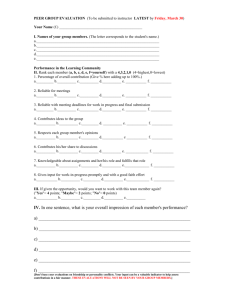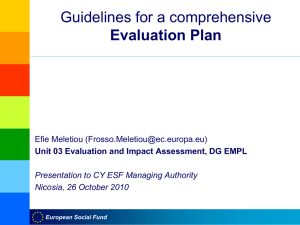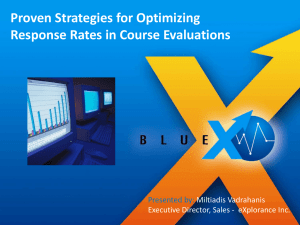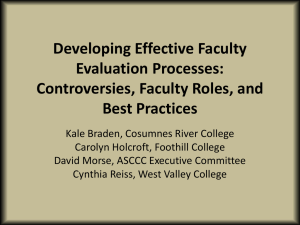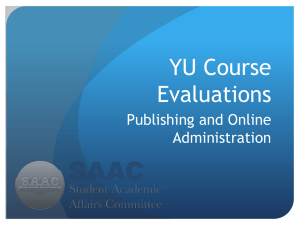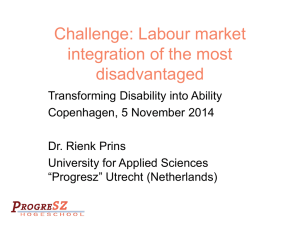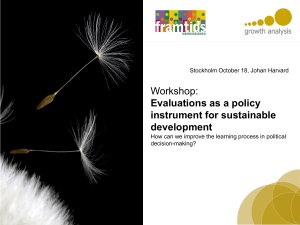Poster_gcarpen1 evaluation.poster.prjt - Scholars
advertisement
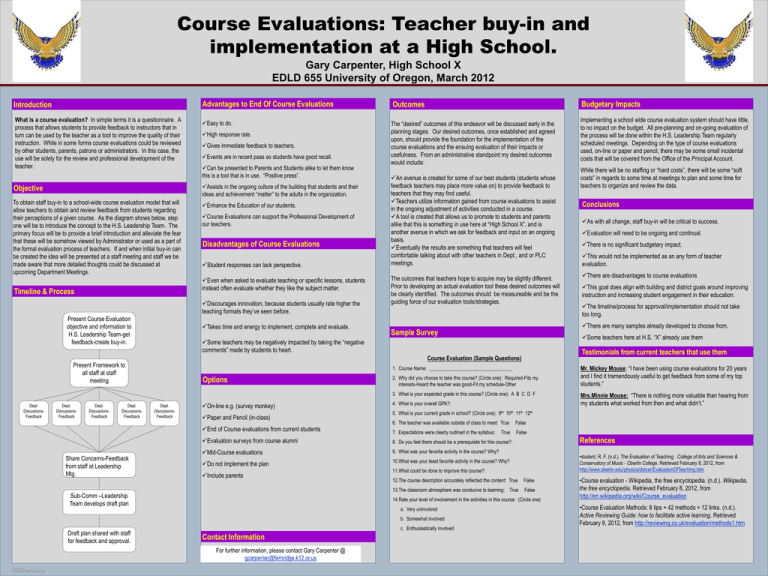
Course Evaluations: Teacher buy-in and implementation at a High School. Gary Carpenter, High School X EDLD 655 University of Oregon, March 2012 Advantages to End Of Course Evaluations Introduction What is a course evaluation? In simple terms it is a questionnaire. A process that allows students to provide feedback to instructors that in turn can be used by the teacher as a tool to improve the quality of their instruction. While in some forms course evaluations could be reviewed by other students, parents, patrons or administrators. In this case, the use will be solely for the review and professional development of the teacher. Easy to do. High response rate. Gives immediate feedback to teachers. Events are in recent pass so students have good recall. Can be presented to Parents and Students alike to let them know this is a tool that is in use. “Positive press”. Assists in the ongoing culture of the building that students and their ideas and achievement “matter” to the adults in the organization. Objective To obtain staff buy-in to a school-wide course evaluation model that will allow teachers to obtain and review feedback from students regarding their perceptions of a given course. As the diagram shows below, step one will be to introduce the concept to the H.S. Leadership Team. The primary focus will be to provide a brief introduction and alleviate the fear that these will be somehow viewed by Administrator or used as a part of the formal evaluation process of teachers. If and when initial buy-in can be created the idea will be presented at a staff meeting and staff we be made aware that more detailed thoughts could be discussed at upcoming Department Meetings. Enhance the Education of our students. Course Evaluations can support the Professional Development of our teachers. Disadvantages of Course Evaluations Student responses can lack perspective. Even when asked to evaluate teaching or specific lessons, students instead often evaluate whether they like the subject matter. Timeline & Process Discourages innovation, because students usually rate higher the teaching formats they’ve seen before. Present Course Evaluation objective and information to H.S. Leadership Team-get feedback-create buy-in. Takes time and energy to implement, complete and evaluate. Budgetary Impacts Outcomes The “desired” outcomes of this endeavor will be discussed early in the planning stages. Our desired outcomes, once established and agreed upon, should provide the foundation for the implementation of the course evaluations and the ensuing evaluation of their impacts or usefulness. From an administrative standpoint my desired outcomes would include: An avenue is created for some of our best students (students whose feedback teachers may place more value on) to provide feedback to teachers that they may find useful. Teachers utilize information gained from course evaluations to assist in the ongoing adjustment of activities conducted in a course. A tool is created that allows us to promote to students and parents alike that this is something in use here at “High School X”, and is another avenue in which we ask for feedback and input on an ongoing basis. Eventually the results are something that teachers will feel comfortable talking about with other teachers in Dept., and or PLC meetings. The outcomes that teachers hope to acquire may be slightly different. Prior to developing an actual evaluation tool these desired outcomes will be clearly identified. The outcomes should be measureable and be the guiding force of our evaluation tools/strategies. Sample Survey Dept. DiscussionsFeedback Dept. DiscussionsFeedback Dept. DiscussionsFeedback 1. Course Name: __________________________________ Dept. DiscussionsFeedback On-line e.g. (survey monkey) Paper and Pencil (in-class) End of Course evaluations from current students Share Concerns-Feedback from staff at Leadership Mtg. 2. Why did you choose to take this course? (Circle one): Required-Fits my interests-Heard the teacher was good-Fit my schedule-Other 4. What is your overall GPA?: 6. The teacher was available outside of class to meet: True False 7. Expectations were clearly outlined in the syllabus: False Mid-Course evaluations 9. What was your favorite activity in the course? Why? Do not implement the plan 10.What was your least favorite activity in the course? Why? 12.The course description accurately reflected the content: True False 13.The classroom atmosphere was conducive to learning: True False a. Very uninvolved c. Enthusiastically involved For further information, please contact Gary Carpenter @ gcarpenter@fernridge.k12.or.us POSTER TEMPLATE BY: www.PosterPresentations.com This would not be implemented as an any form of teacher evaluation. There are disadvantages to course evaluations This goal does align with building and district goals around improving instruction and increasing student engagement in their education. The timeline/process for approval/implementation should not take too long. Mr. Mickey Mouse: “I have been using course evaluations for 20 years and I find it tremendously useful to get feedback from some of my top students.” Mrs.Minnie Mouse: “There is nothing more valuable than hearing from my students what worked from then and what didn’t.” •student, R. F. (n.d.). The Evaluation of Teaching . College of Arts and Sciences & Conservatory of Music - Oberlin College. Retrieved February 8, 2012, from http://www.oberlin.edu/physics/dstyer/EvaluationOfTeaching.htm 14.Rate your level of involvement in the activities in this course: (Circle one) Contact Information There is no significant budgetary impact. References 11.What could be done to improve this course?: b. Somewhat involved Draft plan shared with staff for feedback and approval. True 8. Do you feel there should be a prerequisite for this course?: Sub-Comm –Leadership Team develops draft plan Evaluation will need to be ongoing and continual. 5. What is your current grade in school? (Circle one): 9th 10th 11th 12th Evaluation surveys from course alumni Include parents As with all change, staff buy-in will be critical to success. Testimonials from current teachers that use them 3. What is your expected grade in this course? (Circle one): A B C D F Dept. DiscussionsFeedback Conclusions Some teachers here at H.S. “X” already use them Course Evaluation (Sample Questions) Options While there will be no staffing or “hard costs”, there will be some “soft costs” in regards to some time at meetings to plan and some time for teachers to organize and review the data. There are many samples already developed to choose from. Some teachers may be negatively impacted by taking the “negative comments” made by students to heart. Present Framework to all staff at staff meeting . Implementing a school wide course evaluation system should have little, to no impact on the budget. All pre-planning and on-going evaluation of the process will be done within the H.S. Leadership Team regularly scheduled meetings. Depending on the type of course evaluations used, on-line or paper and pencil, there may be some small incidental costs that will be covered from the Office of the Principal Account. •Course evaluation - Wikipedia, the free encyclopedia. (n.d.). Wikipedia, the free encyclopedia. Retrieved February 8, 2012, from http://en.wikipedia.org/wiki/Course_evaluation •Course Evaluation Methods: 8 tips + 42 methods + 12 links. (n.d.). Active Reviewing Guide: how to facilitate active learning. Retrieved February 8, 2012, from http://reviewing.co.uk/evaluation/methods1.htm
